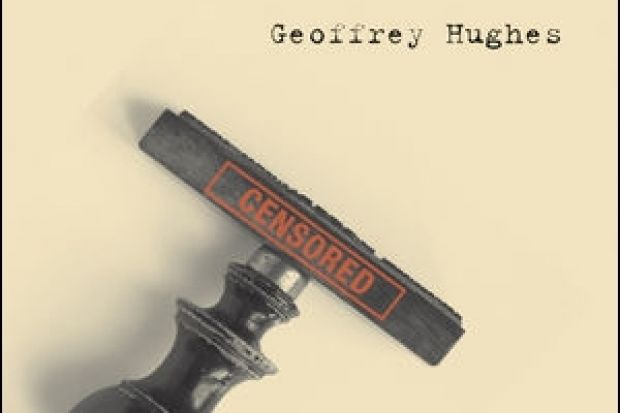Who is the Tolstoy of the Zulus? The Proust of the Papuans?" Saul Bellow asked, at the height of the "political correctness" debates lashing US campuses in the 1990s. One must maintain a sense of humour when entering this arena, where voices of the global cultural elite sometimes present themselves as brave and daring for taking potshots at the sidelined or powerless. However, it was mild tedium, rather than hilarity or anger, that accompanied my turning the pages of Geoffrey Hughes' book on political correctness. An emeritus "historian of the English language", Hughes knows a lot about dictionaries of every stripe, whether orthodox or slang. He can provide the history of innumerable words, enabling readers to follow semantic changes, neologisms and other evolutions in the "word field", attentive, primarily, to anglophone usage.
In these pages, we read about Francis Grose's "splendid" Classical Dictionary of the Vulgar Tongue (1785), with its "ironic absurdities" such as "porker" for Jew and "bogtrotter" for Irishman. Hughes is well aware of, if not hugely troubled by, the prejudicial nature of mainstream dictionaries, whether tracking the pejorative uses of the noun "Jew", recorded as "a name of opprobrium or reprobation" dating from around 1600, in the Oxford English Dictionary, or the shifting derogatory terms for "non-whites", from the enduring "savage", "barbarian", "nigger" and "kaffir" to endless noxious variants in standard lexicons or rougher coinages, such as "jungle bunny", first recorded in the Random House Historical Dictionary of American Slang (1959). However, what does mildly trouble Hughes is the issue of "semantic engineering", with its potential threat to the "vital elements of a free society", freedom of speech and matters of choice.
Assessing the risk, Hughes places the history of "actual word usage" alongside the impact of those who have tried to alter language usage. The exponents of political correctness, we learn, are people hoping to expunge traditional connotations infused with stigma, discrimination, disparagement - from "cripple" to "crumpet". Included in this group are also academics - cultural scholars in particular - who have challenged the Western canon for a culture more ordinary, texts more inclusive. Pondering their legacy, Hughes revisits works by the most influential scholars and pundits, primarily from the US, who have expressed most alarm over political correctness, notably Allan Bloom's The Closing of the American Mind (1987), Dinesh D'Souza's Illiberal Education: The Politics of Race and Sex on Campus (1991) and Roger Kimball's Tenured Radicals: How Politics Has Corrupted Our Higher Education (1991).
Foolishly, I hoped political correctness debates had faded away with that defensive decade of the 1990s, during which talk of the Left's "thought police" was endemic, even as that Left itself was conspicuous by its near-total absence from the battlefield. College campuses of the quiescent Nineties, unlike earlier decades, were rarely the site of impassioned debate, let alone disruptions or sit-ins, as students, buckling down to their studies, worried most about their future job prospects. Recalling that decade in The Myth of Political Correctness: The Conservative Attack on Higher Education (1995), John K. Wilson writes: "When I first heard about 'political correctness', I wondered what I was missing. Where were the tenured radicals indoctrinating me with leftish propaganda?" Where, indeed?
However, I learn from Hughes that attacks upon putative Left activists and scholars - those addressing issues of equality, diversity, pejorative language, syllabus expansion - are with us still. In Britain, Roger Scruton, in 2007, again rode forth to combat the nihilism of modern intellectuals whom he sees repudiating the values of Western high culture by treating all cultures as equal. What Hughes fails to emphasise, however, is the glee with which the "liberal" press seizes upon such arguments, making nonsense of the notion that there is any silencing of Scruton's voice, or those he extols. In 2006, Guardian journalist Gary Younge did his own word checking, discovering that in one month, "'political correctness' was used in the British press on average 10 times a day - twice as frequently as 'Islamophobia', three times as 'homophobia' and four times as 'sexism'".
Attentive primarily to the voices of conservatism, Hughes is unaware that the best critics of any perceived haste to legislate around language usage are the same cultural critics who remain the targets of anti-PCers. Thus, it is Stuart Hall, Britain's foremost cultural scholar, who could have told Hughes that anyone who understands the importance of language knows the limitations of word substitutions, since language is always "multi-accentual, and meaning is always on the slide". Similarly, it is that ogre of the anti-PC brigade, Judith Butler, who argues in Excitable Speech that legislation against "hate speech" will always backfire.
In this book, Hughes' lexicographical skills are unfortunately not accompanied by either the analytical lucidity or the interpretative rigour required to illuminate the historical entanglements of shifting semantics, politically incorrect or otherwise.
Political Correctness: A History of Semantics and Culture
By Geoffrey Hughes Wiley-Blackwell
336pp, £55.00 and £17.99 ISBN 97814051585 and 592 Published 28 October 2009
Register to continue
Why register?
- Registration is free and only takes a moment
- Once registered, you can read 3 articles a month
- Sign up for our newsletter
Subscribe
Or subscribe for unlimited access to:
- Unlimited access to news, views, insights & reviews
- Digital editions
- Digital access to THE’s university and college rankings analysis
Already registered or a current subscriber? Login
